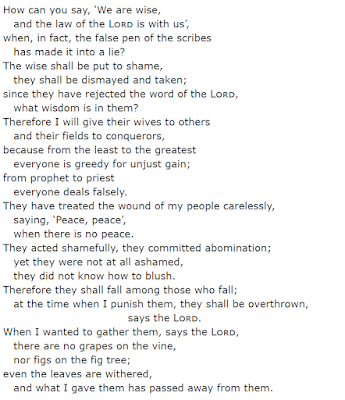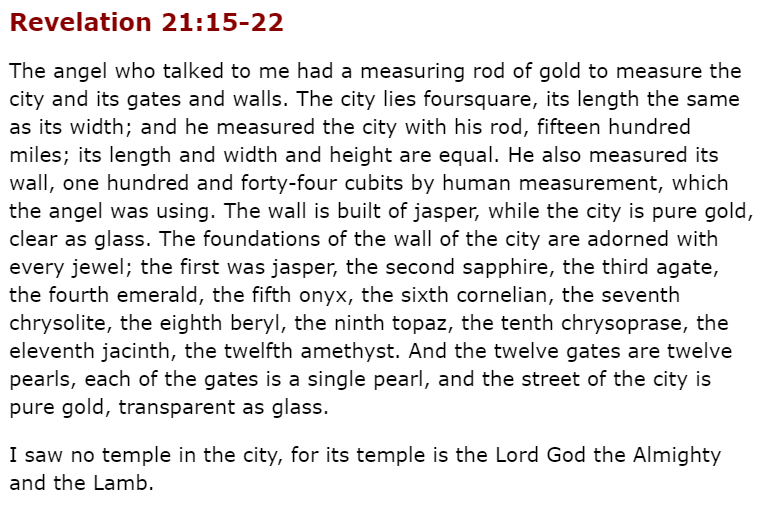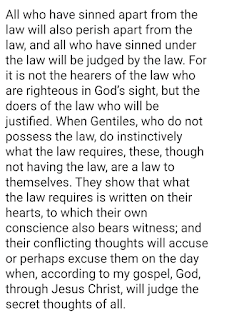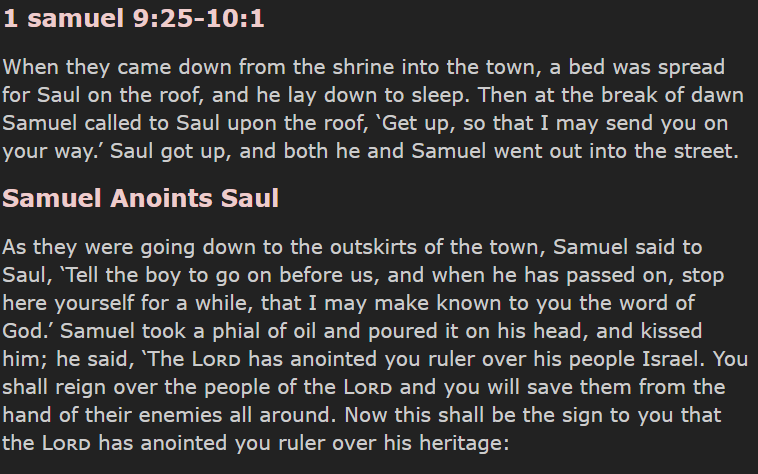"But those who drink of the water that I will give them will never be thirsty." -John 4:14
Tuesday, December 13, 2022
Jude 17-25 Laughter is a Shield
Tuesday, November 22, 2022
Revelation 22:8-21 Moments of Wonder
Tuesday, November 8, 2022
2 John 7-11 "The Antichrist"...It's A Lot Less Scary Than You Think
Application: Second John strikes at the heart of a question I've been struggling with for years. How much disagreement in a community of faith is too much? At what point do peoples beliefs become so extreme and so contradictory as to become "anti-Christ"? And what do we do when we get there? Shunning in the way this letter describes--not welcoming with or eating with these folks--in itself seems extreme. If this were strictly followed, a lot of Thanksgiving Dinners would have to be canceled.
I'm not sure where the line is for me. I've had wonderful interfaith partnerships, as well as partnerships with Christians whose beliefs differ sharply from my own in various ways. Yet I do take very seriously my role as "pastor" and spiritual guide to the people of my congregation, and I am contacted often by organizations whose beliefs and agenda are so different from the ones I find in Christ, that can't promote them or give them a platform here.
The basic takeaway I get from 2 John is: just because it has Jesus' name on it does not mean it's from the Lord. Unfortunately, there is too much evil and deception in the world for Christians to simply trust that anything with the "Jesus brand" is good. Yet if it is in fact "anti-Christ", it will be ultimately defeated by the truth, because we know the Way, the Truth and the Life, and he has won already.
Prayer: God, guide us in the truth. Guide us to Christ, and away from ways of thinking and living which oppose him. In your name we pray, Amen.
Tuesday, October 25, 2022
1 Peter 5:1-11 Humble Leaders
Tuesday, October 11, 2022
Ephesians 6:10-12 Doing Battle
Tuesday, September 27, 2022
James 5:1-6 If We Don't Fix It, God Will
Tuesday, September 20, 2022
1 Corinthians 9:19-23 Inauthentic vs. Authentically Interested
Tuesday, September 13, 2022
Jonah 3:1-10 Prepared For A Response
Application: I have an embarrassing story to tell. As a committee chair for my son's Cub Scout pack, I gathered with other families to plan a "join night" event for our pack last night. We did all the prep we had time to do. We shared flyers with the students of his school; we shared events online; we told friends. But all of this was rather last-minute, and to be honest I was expecting a few inquiring families, but not much more. Instead, we were totally overwhelmed! We could hardly get the grill going before there were twenty kids requesting burgers! I ran out of craft supplies and had to ask my sons to step back and let newer kids give it a try! It was kind of a mess, and I felt really awkward for not believing that we actually had something good going on here that folks would want to know about. Hopefully they'll forgive us for not expecting such a big response.
I guess that's not a spiritual story, but it does speak to an attitude I have to fight against in these times. In my calling as a pastor, I've gotten way too used to asking, "what will we do if nobody shows up?" and not at all accustomed to asking, "What if the response is totally overwhelming? What if God's Word really does what it promises to do, and people's hearts are moved? What if something shifts, and all of a sudden we're surrounded by people whose lives God has changed?" I don't want to be caught off guard, like Jonah was. If we are bold enough to spread the word, we should be prepared for big stuff to happen.
Prayer: God, you exceed our expectations every day. Thank you. Help me be ready for the big things you will do. Amen.
Tuesday, September 6, 2022
1 Timothy 4:6-16 Training in Godliness
Observation: The author gives Timothy, a young Christian pastor, advice on how to lead a church. Provide sound teaching to the community. Have nothing to do with "profane myths and old wives tales" (teaching that contradicts what he has already learned) and train himself for godliness the way an athlete trains for a physical challenge.
Application: Today, I exercised on the elliptical machine for the first time in...a long time. Many months, to be honest. My kids got up obscenely early, and we dropped them off at the bus stop for their first day of school. We're getting our bodies and minds back into "the routine" that will be normal for a new school year.
This season of transition is a good time to remember that "godliness," which I would define as spending time with Jesus and actively trying to follow him in daily life, is a skill that does not happen by accident. An athlete does not accidentally get up in the morning and run miles while others sleep. Neither does a disciple of Jesus make progress in a spiritual path. It's a series of little decisions, day by day, hour by hour. It's not always forward motion. There will be setbacks. But if we are expecting that our prayer life, our worldview, our acts of love and justice, our way of living, will just change on their own, without our opening up space in our lives everyday, we will be disappointed.
Now is a good time to recommit. Let's get back to training.
Prayer: Jesus, I am here for you today. Thanks for meeting me where I am. Amen.
Tuesday, July 12, 2022
Proverbs 19: An Ethic for Work, An Ethic for Generosity
Tuesday, July 5, 2022
Jeremiah 8:4-13 "Peace, Peace"
Tuesday, June 14, 2022
Life Together, Ch. 1: Community Through Christ and In Christ
Wednesday, June 8, 2022
From Bonhoeffer's "Life Together": Taking the Temperature of Community
Tuesday, May 31, 2022
Luke 1:39-57 The Holy Spirit in Community
Tuesday, May 24, 2022
Revelation 21:15-22, "Resistance is Futile" ;-)
Application: Just as with many verses from Revelation, you can go down all sorts of rabbit holes if you try to take it literally. You could plot out what water, sewer, and electricity would need to be for such a facility, get with some urban planners, and predict the cost of construction and predicted population. That's one way to resist what the text is really trying to say to us.
You could also do a deep dive into the symbolism, talk about the precious stones (which happen to be the same ones on the high preist's breastplate in the Old Testament, which means the city itself is a temple!) or other details of the text. That might yield some intellectual insights, but it might also distance you from the meaning of the text for our hearts. Another way of resisting the meaning.
The best way to stop "resisting" the meaning of this text, for me, is to just ask: what is God saying to me in the midst of this? And to that, the answer is simple. "I want to be close to you." God's desire is to live with us, in such a way that there aren't any divisions between the holy and the common, between the people we wish we could be and the people we know we are. There won't be temples or churches, where we set aside a little of our time, talent and treasure for a little of our week. We will live together with the one who created us and saved us. It may not look like a "Borg cube", and it may not be solid gold, but it will be deeply meaningful and rewarding. It will be life as God meant it to be.
Prayer: God, sometimes I use my mind to take a step back, and resist hearing what you have to say to my heart. Help me take a break from that today. Amen.
Tuesday, May 17, 2022
Acts 11:27-30 Dwelling Together in Unity
 Observation: In a time of famine, the church in Antioch (Paul's home church) undertakes the first large scale relief effort to benefit Christians in Judea, where this whole movement started. Christians in this time share a close bond, which in that time was socially similar to kinship. Much of their property was held in common. Caring for members in the community was a high priority at a time when there was no social safety net. It was not just a figure of speech to say they lived like a family.
Observation: In a time of famine, the church in Antioch (Paul's home church) undertakes the first large scale relief effort to benefit Christians in Judea, where this whole movement started. Christians in this time share a close bond, which in that time was socially similar to kinship. Much of their property was held in common. Caring for members in the community was a high priority at a time when there was no social safety net. It was not just a figure of speech to say they lived like a family.Tuesday, May 10, 2022
Acts 9:32-35 Here and There Among All the Believers
 |
| Father Henry Whitehead, curate of St Luke's Parish, Soho, London, 1854 |
The second thing I notice is that Peter meets Aeneas by going "here and there among all the believers." He's on patrol, so to speak. His job as shepherd of the flock is to be walking around, visiting with people and listening to their problems.
Application: Aeneas's healing story reminds me of a book I read several years ago called "The Ghost Map," a nonfiction account of the cholera outbreak of Soho, London in 1854, an early test case for the germ theory of contagion that was later proven correct. Doctor John Snow has, rightly, been given credit for pinpointing a certain well in Soho that was making people sick due to unsanitary conditions. But the other part of the story is where Dr. Snow got much of his raw data: from an Anglican priest named Henry Whitehead, who knew who was getting sick, where, when, and which well they drank from, because he was doing the same job pastors have done for centuries. He was going "here and there among all the believers." He walked the streets, talked to people at home, at work, and all around his parish--which meant not just those who faithfully worshipped at his church, but everyone who lived and worked nearby. He was responsible for their spiritual welfare, but because he cared for the whole person, he provided a vital piece of the puzzle for a public health mystery that had plagued Europe for centuries and caused untold deaths. God put Father Whitehead in the right place at the right time.
Pastors do a lot of things. In fact, each new generation seems to pile on a new job title: administrator, therapist, cruise director, community organizer, entrepreneur, broadcaster, the list goes on and on. But Peter's story in Acts 9, and the story of Snow and Whitehead, remind me of a role that can't be neglected: shepherd. It's important to be in one another's lives at times other than Sunday. To visit, and check in, both physically and digitally, not just in times of crisis but on regular days too. We could all stand to follow Peter's example. You never know what tasks God will assign you until you go "here and there among all the believers."
Prayer: God, send me out on patrol today. Help me connect with the people in my "parish" here in Northern Michigan, both members of our church and those in our neighborhood. I'm ready to work. Amen.
Tuesday, May 3, 2022
Ezekiel 1:26-2:1 Who You're Talking To
Tuesday, April 26, 2022
Esther 8:1-17 A Minority Story
Tuesday, April 12, 2022
Isaiah 49:4-6 Thinking Too Small
Tuesday, April 5, 2022
1 John 2:24-28 Abiding
Tuesday, March 29, 2022
Revelation 19:9-10 Testify
Tuesday, March 22, 2022
Romans 2:12-16 Apart From the Law
Prayer: God, thanks for teaching me through the lives of others. Amen.
Tuesday, March 15, 2022
1 Corinthians 10:1-13 None of This is Magic.
Tuesday, March 8, 2022
Zechariah 3:6-10 In a Single Day
Tuesday, March 1, 2022
Acts 10:25-28 Call No One Profane or Unclean
Tuesday, February 8, 2022
1 Samuel 9:25-10:1b Anointed
Observation: The people of Israel have lived under judges for centuries. Now they have asked God for a human king, like other nations have. After giving them a stern warning that kings are more trouble than they're worth, the prophet Samuel concedes. God reveals to him Saul, from the house of Benjamin. In this scene, Samuel privately anoints Saul as king over Israel, to "reign over the people of the Lord and save them from the hand of their enemies all around." This anointing with oil was an important part of the coronation of kings from then on (I know it continues to be practiced in the coronation of European kings and queens to this day. You can see this dramatized in the Netflix series "The Crown.") Anointing with oil symbolizes God's mandate for a ruler to reign in God's name, for the good of the people.
Anointing is a very important part of Christian theology, as well. "Christ" is not Jesus' last name, but rather his title. It is Greek for "anointed". In Hebrew the word is "Messiah." And to those who believe in Jesus, it means he is God's chosen ruler of the people of Israel, and God's world.
Application: It's kind of strange to refer to myself as "anointed," but since I'm baptized, that's what I am. We are anointed with oil after our baptism, to show that we too are connected to Christ, tasked with "ruling" in his name. But if you know Jesus, you know this simply means we serve and love others in his name. Unlike King Saul, who quickly let power go to his head, the power we receive from Christ at our anointing should be humbling. It means we have a duty to live in this world, and fully engage in our communities as ambassadors for Christ, our king. It means we have authority to speak boldly to the powerful, in defense of the powerless. And it often means taking up a cross, as Jesus did, rather than use our power and privilege to defend ourselves. It's awesome, in the true sense of the word. But in the colloquial sense, it does not always feel awesome. To quote a favorite movie, "with great power comes great responsibility."
Prayer: Jesus Christ, anointed king, I have been anointed in your name. I didn't do anything to deserve it, and apart from your Spirit, I do not have the gifts to live up to it. But because you have chosen me, help me and equip me to live as your ambassador. In your name I pray, Amen.
Tuesday, February 1, 2022
2 Kings 5:9-13 Faithful in a Little
Application: A hard lesson I have to learn over an over is that the small stuff counts. Even the tiny choices matter. The other night I found myself talking with my sons about manners. Just basic stuff, like saying "thank you" for a gift, even if it's not our heart's desire, or saying "I'm sorry" if you hurt someone, even if it's an accident. My oldest son especially has problems understanding why you can't just be honest about how you feel, and why any of this is a big deal. I remember as a kid, and even as a teen, thinking something similar: a lot of the social conventions my parents drilled into me seemed kind of "fake," like putting on airs, rather than just leveling with people about how you're feeling. Why say "thank you" if you're not thankful? Why say "sorry" if it isn't your fault?
What I found myself saying to my kids is something that relates to this reading about Naaman. If you believe in big acts of kindness, then little ones are great practice. If Naaman would have been willing to do something big to be healed, then why not do something little? Not every day will be a great hero's journey. Some days will just be to the bus stop and back. Yet God gives you the short trips to make you ready for the longer ones. How we treat others when the stakes are low can have an effect on how the bigger days will go. I don't know who said it, but I think Elisha would agree: "If you're too big to do the small things, you're too small to do the big things."
Prayer: God, train me to be faithful in small things. Help me value this day, no matter how big or small the choices in it will be, as a gift from you.































